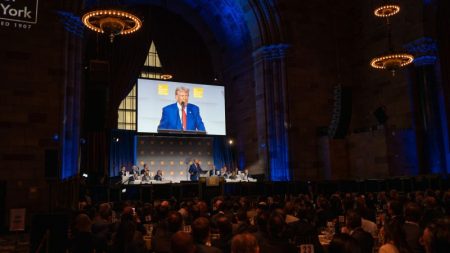Unlock the Editor’s Digest for free
Roula Khalaf, Editor of the FT, selects her favourite stories in this weekly newsletter.
Standard Chartered chief Bill Winters has praised the “serious” new Labour government in an early sign that the party is winning over senior UK business figures in its first weeks in office.
The bank chief said the Labour party, which returned to power this month after 14 years of Conservative rule, had shown clear signs that it was “supportive of business”.
“It’s a serious government and they’ve set out serious statements and platforms,” Winters said on Tuesday. “I have every confidence that the chancellor and the rest of the government will pursue their policies in a transparent . . . way.”
The remarks are a sign that the Labour government’s message of economic stability and “pro-growth” initiatives are resonating with business leaders, even as it cracks down on tax breaks for wealthy expatriates and private equity bosses. Winters said he was “very happy” that the bank was based in the UK.
His comments came as StanChart announced a $1.5bn share buyback, its biggest ever, after second-quarter profits were boosted by its wealth management business.
The bank reported pre-tax profits of $1.6bn during the quarter, beating analysts’ estimates of $1.5bn. Growth was driven partly by the bank’s wealth business, where operating income rose 27 per cent as the bank attracted larger numbers of affluent clients.
Winters said the bank’s strategy was “working pretty much on every front” and that he was “really very happy with the results”.
He added that he was optimistic about China, despite ongoing tensions between Washington and Beijing. He acknowledged that the tensions were likely to remain unchanged regardless of who won the US election in November.
“The more China is under pressure from international partners, the more they’re inclined to open up,” Winters said, adding that while geopolitical tension “undermines sentiment” it was not “affecting our business”.
The emerging markets-focused bank makes most of its money in Asia, particularly in Hong Kong and Singapore, and China remains an important market.
Winters, who has run StanChart since 2015 and is by far the longest-serving chief executive of a major UK bank, said he hoped to be “more than a flash in the pan”, but there were “excellent candidates” internally and externally to replace him in “in due course”.
He has sought to cut costs and respond to criticism that the bank is too bureaucratic and spreads itself too thinly across a range of countries, products and clients. He said in February that he took those challenges “to heart”.
Operating expenses in the second quarter rose 4 per cent on a constant currency basis, which the bank said was driven by inflation and business growth.
StanChart’s shares have risen since the start of this year but are down 17 per cent since Winters took the helm.
The bank is upgrading its forecast for operating income growth, saying it now expects the figure to rise more than 7 per cent in 2024, up from its previous projection of 5 to 7 per cent.
The bank has been under pressure to improve shareholder returns and previously pledged billions of dollars worth of share buybacks as well as higher dividends. It unveiled a $1bn share buyback in February.
The bank’s reported return on tangible equity, a key measure of profitability, was 10.4 per cent for the quarter, down from 10.8 per cent a year earlier.
Reported net interest income fell to $1.6bn in the second quarter, from $2bn the same time last year, as the benefit from higher interest rates tailed off.
The bank took total credit impairment charges of $73mn in the second quarter, linked partly to its wealth and retail banking business.
Income in its global markets business fell 7 per cent year on year on a constant currency basis, which the bank said was due to a “strong comparator” from the same time last year.
StanChart has previously been hit by its exposure to mainland China, taking impairment charges relating to commercial property in the country and its stake in China Bohai Bank. It said its exposure to Chinese commercial real estate was now down $200mn to $2.2bn.
In February, Winters lamented the bank’s “crap” share price, saying it did not reflect its true value. On Tuesday, the bank’s shares were trading 5 per cent higher in London on the earnings news. Winters said he was “happy relative to where it was” at the time of those comments, but the share price still did not reflect his “optimism” about the bank’s performance.
StanChart this year unveiled a plan to save about $1.5bn of expenses over the next three years by simplifying systems.
The bank’s chief financial officer Diego De Giorgi described it as a “grassroots . . . movement” in which staff were “embracing the opportunity to transform the bank”.
Asked how many job cuts there would be, Winters said: “I have no idea”, because it would be a voluntary attrition process.
Winters has overhauled the bank’s management in the past year, bringing in former Bank of America executive De Giorgi in January. He appointed trading boss Roberto Hoornweg and Africa and Middle East head Sunil Kaushal to head its investment banking business, its largest division, after former boss Simon Cooper left the bank in March.
StanChart has sounded out UK political figures Sir Charles Roxburgh and Sir Sajid Javid as potential candidates for its next chair, the Financial Times reported in February. Current chair José Viñals is nearing the end of a nine-year term limit for independent directors.
Read the full article here



